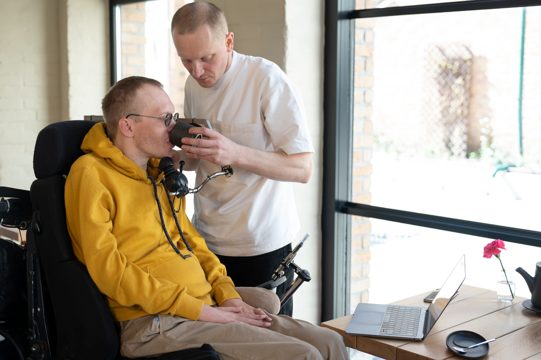Assisted Living Facilities: Weighing the Options
Assisted living facilities are designed for older people who are no longer able to manage living independently and typically need a little bit of help with daily activities such as bathing or dressing. The decision for a loved one to move into an assisted living facility is often a complex one.
Its important to include your loved one, if you can, in the decision-making process. Assisted living facilities serve as a safe, comfortable and caring environment specifically designed for senior citizens who find it challenging to manage their daily living activities independently. These facilities cater to those who may need assistance with routine activities such as bathing, dressing, medication management, and meal preparation. Providing not just a place to live, but a community that cultivates a sense of belonging, these facilities ensure that the golden years of our older loved ones are spent in comfort, safety, and dignity. The decision to transition a loved one into an assisted living facility is often layered with emotional complexity. It requires careful thought, compassionate discussions, and deep understanding of the person's needs and preferences.

Such a decision is never easy and should never be made hastily. It's not just about selecting a suitable environment for them, but also about ensuring their emotional well-being during this huge change in their life.
It's vitally important to involve your loved one in the decision-making process, if at all possible. This allows them to express their thoughts, fears, and desires, and also helps them feel more in control of their life. This is a significant step in their journey, and they will feel more comfortable and at ease if they are a part of the process. It's about maintaining their dignity and respect, while ensuring that their needs and welfare remain at the forefront of all discussions and decisions. In this way, the transition to an assisted living facility can be made smoother, more comfortable, and more beneficial for your loved ones, offering them a new chapter in life where they can thrive and live with the support they need.
Range of Assisted Living Services
Assisted living facilities offer a wide range of services to meet the varying needs of their residents. These may include access to a pharmacy, dietary and nutritional guidance, physical, occupational and/or speech therapy, hospice care, skilled nursing care, mental health services or counseling, and social worker services.
Assisted living facilities are indeed a haven for those who require specialized care and attention. They offer a comprehensive suite of services designed to cater to the unique and diverse needs of their residents. These services span across a wide spectrum, including but not limited to, easy access to a well-stocked pharmacy for all the medicinal needs, dietary and nutritional guidance by professional dieticians and nutritionists who craft personalized meal plans to ensure each resident is receiving the proper nutrients their bodies need to function optimally. Moreover, the facilities also provide physical, occupational, or speech therapy sessions as needed. These therapies are delivered by trained and licensed therapists who work closely with each resident, helping them maintain or regain their strength, dexterity, and communication skills. Hospice care is another crucial service offered, ensuring that residents in their twilight years receive compassionate care and comfort.

The facilities also house skilled nursing care for those who require it, with a team of registered nurses, licensed practical nurses, and nursing assistants on-site 24/7, providing round-the-clock care and attention. Additionally, mental health services or counseling are also provided, given the understanding that emotional and psychological well-being is as important as physical health.
Licensed mental health professionals provide these services, offering residents support, guidance, and therapies to promote mental health wellness. Perhaps one of the most overlooked services, yet one of the most critical, is the availability of social worker services. Social workers play a pivotal role in the resident’s life, helping them navigate through the challenges that come with aging and providing them with the resources and support they need to lead fulfilling lives. They act as an advocate for the residents, helping them access the services they need, addressing any concerns or issues they may have, and ensuring their rights and dignity are respected. Thus, assisted living facilities are not just establishments offering care; they are communities fostering wellness, respect, and dignity.
Access to a Pharmacy
Many assisted living facilities have a pharmacy on-site or partnerships with local pharmacies to ensure residents have easy access to necessary medications. Numerous assisted living communities go the extra mile in providing comprehensive healthcare services, one of which includes having an on-site pharmacy or beneficial partnerships with local pharmacies.
This strategic move ensures residents are always within easy reach of their necessary medications. It's more than just a convenience; it's a lifeline, a transparent demonstration of their commitment to prioritizing the health and well-being of the residents above everything else. Moreover, this initiative also fosters a sense of independence, as residents no longer have to worry about arranging transportation for their medication needs.

It also eliminates confusion and stress related to navigating the often complex world of pharmaceuticals. This crucial service can indeed provide significant peace of mind for both residents and their loved ones.
In addition, it promotes a better continuity of care as the facility's medical staff can closely monitor medication usage, ensuring they are taken as prescribed, and promptly addressing any potential side effects or interactions that might occur. This integrated approach to medication management underscores the assisted living facility’s dedication to providing a seamless, holistic healthcare experience, where every resident's needs are met with utmost care and attention.
Dietary and Nutritional Guidance
Assisted living facilities often have nutritionists or dieticians on staff to ensure residents are receiving balanced, healthy meals that cater to their specific dietary needs. Indeed, assisted living facilities prioritize the well-being of their residents by employing well-qualified nutritionists or dieticians as an integral part of their team.
These health professionals play an essential role in crafting diets that are not only balanced and healthy but also tailored to meet the unique dietary requirements of each resident. They consider factors like age, activity level, and existing medical conditions, transforming the potentially challenging task of meal planning into a streamlined, hassle-free process. Moreover, these experts not only focus on the nutritional aspect but also ensure that the meals are appetizing and varied, which makes a significant impact on the residents' quality of life. From crafting creative menus that keep mealtime interesting to conducting regular dietary assessments, these specialists work tirelessly behind the scenes.

This approach helps residents look forward to their meals, while simultaneously adhering to their health guidelines. In essence, the presence of nutritionists or dieticians in assisted living facilities elevates the standard of care provided.
It reassures families that their loved ones are not just receiving the basic necessity of food, but that their meals are specially designed to enhance their health and overall well-being. These facilities, therefore, offer an environment that is not just focused on living, but on living well, with nutritionally balanced, pleasing, and health-boosting meals.
Therapies And Care Services
Many facilities offer physical, occupational and/or speech therapy to residents who require such services. They may also provide hospice care and skilled nursing care for those who need more intensive support.
In an effort to cater to a diverse range of needs and circumstances, numerous facilities extend a broad spectrum of services including, but not limited to, physical, occupational, and speech therapies. These facilities demonstrate a deep understanding of the unique challenges faced by their residents, thereby ensuring they offer personalized care plans that best fit the individual's needs. This may include those recovering from surgery, accidents, or illness who require physical therapy to regain strength and mobility. Occupational therapy, on the other hand, is provided to support those needing assistance with daily life skills, such as dressing, cooking, or other self-care tasks. Speech therapy is also available, focusing on enhancing communication skills and addressing issues such as swallowing difficulties. Moreover, provisions for hospice care are made for those residents nearing the end of their lives.

This service is incredibly vital as it provides not only medical care but also emotional and spiritual support to the residents and their families during such challenging times. The goal is to ensure the utmost comfort and dignity for the residents in their final days.
In addition to these, for those who necessitate more intensive support, skilled nursing care is readily available. This advanced level of medical care is delivered by professional and experienced nurses, around the clock, ensuring that residents receive the comprehensive care they require. Skilled nursing care may involve wound care, intravenous therapy, injections, physical therapy, and more. In conclusion, these facilities are well-equipped and committed to providing a wide range of services, ensuring residents receive the highest quality of care, tailored to their specific needs, in a nurturing and supportive environment.
Mental Health Services or Counseling
Mental health services and counseling are often available to support residents with cognitive impairment or other mental health issues. Indeed, mental health services and counseling play a pivotal role in our society, providing invaluable support for residents grappling with cognitive impairment or other mental health issues.
These services encompass a vast spectrum of therapeutic interventions, ranging from one-on-one counseling sessions to group therapy, and even immersive therapy programs which can be tailored to suit the specific needs of every individual. They stand as a beacon of hope for those who are navigating the labyrinth of mental health challenges, offering them the tools to understand, manage, and ultimately overcome their personal obstacles. Furthermore, these mental health services not only cater to those with cognitive impairments like dementia or Alzheimer's but also extend their expertise to individuals wrestling with a wide array of mental health issues, such as depression, anxiety, PTSD, and more. Counseling, in particular, offers a safe, non-judgmental space for individuals to express their thoughts and feelings, fostering a nurturing environment that encourages healing and personal growth.

Through empathetic listening and evidence-based therapeutic strategies, counselors guide these individuals on their journey towards mental well-being, empowering them to reclaim control over their lives. Moreover, these services are often accessible to everyone, irrespective of their age, gender, or social status, reaffirming the universal importance of mental health.
In an era where mental health issues are on the rise, it's incredibly reassuring to know that help is available, ready to make a profound difference in the lives of those who need it most. Mental health services and counseling truly epitomize the essence of community support, standing in solidarity with those battling cognitive impairment or other mental health issues, and providing them with the resources they need to thrive.
Social Worker Services
Social workers are often part of the staff at assisted living facilities. They can provide invaluable support and advocacy for residents and their families.
Taking on a crucial role within the health care team, social workers emerge as an integral part of the staff at assisted living facilities. Their presence adds a humanistic touch to the environment, creating a warm and welcoming feel for everyone present - residents, families, and staff alike. Social workers are essentially the glue that binds everyone together, ensuring that each resident's welfare is prioritized, respected, and met with compassion. Their role is multifaceted, extending far beyond just basic care. They work tirelessly to provide invaluable support to the residents, offering not just physical but also emotional and mental wellbeing. Their tasks may involve helping residents with daily chores, providing emotional support during difficult times, or advocating for their rights and needs. They are often seen as a beacon of hope, illuminating the lives of the residents with their care and understanding.

Additionally, they also serve as a liaison between residents and their families. They ensure that there is a smooth flow of communication, enabling families to stay updated about their loved ones' well-being.
They facilitate understanding, help resolve concerns, and provide advice and guidance whenever required. They act as a solid rock on which residents and their families can lean on during times of uncertainty. In conclusion, social workers play an indispensable role in assisted living facilities. They do more than just care for residents; they cultivate an environment of trust, respect, and empathy. Their commitment to advocating for residents and their families is both commendable and vital for the overall functioning of these facilities. Indeed, the presence of social workers in these settings is not merely a necessity but a blessing.
How to Find Facilities in Your Area
There are several resources for finding assisted living facilities in your area. You can consult your local or state health department, The Yellow Pages, or organizations like LeadingAge or Argentum.
Finding the perfect assisted living facility in your area may seem like a daunting task, but fear not, there are a plethora of resources readily available to guide you on this journey. You can begin your search by consulting with your local or state health department. These government agencies have access to a wealth of information and can provide valuable insights into the various facilities and the services they provide. They can also help you understand the finer details of the cost, availability, and quality of care provided. Another invaluable resource is the good old Yellow Pages. While it may seem a bit antiquated in the digital age, this comprehensive directory can provide you with a list of all the assisted living facilities in your area.

Moreover, it can also give you a clear idea of the scale of operations of these facilities and their locations, helping you pinpoint options that would be most convenient for you. Alongside these traditional methods, there are also organizations specifically dedicated to helping you find the right assisted living facility.
LeadingAge and Argentum are two such organizations that offer a plethora of services designed to help you make an informed decision. They provide information about the different types of assisted living facilities, the specific services offered by each, and even offer resources to help with the financial aspects of assisted living. These organizations are a treasure trove of knowledge and can provide invaluable guidance in navigating the complexities of selecting the right assisted living facility. In conclusion, while the process of finding the right assisted living facility may seem challenging, remember that you are not alone. There are ample resources – be it your local health department, the timeless Yellow Pages, or specialized organizations like LeadingAge and Argentum – that are ready and equipped to offer the support and guidance you need.
What to Look for When You Visit
When visiting potential facilities, pay attention to the cleanliness of the facility, the demeanor of the staff, the happiness of the residents, and the overall atmosphere. Ask about the services offered and the cost.
When embarking on the crucial journey of visiting prospective facilities, it's imperative to adopt a keen eye for detail. The cleanliness of the facility is of paramount importance. Not only does it speak volumes about the level of care and professionalism, but it can also be a key indicator of the level of health and hygiene maintained, something that directly impacts the well-being of the residents. Equally important is the demeanor of the staff. They are the ones who will be interacting with the residents on a daily basis, providing them with the necessary care and support. Their attitude, behavior, and level of empathy can significantly influence the quality of life within the facility. Be sure to observe their interactions with the residents, as this can give you a realistic picture of what to expect. Moving on, the happiness of the residents should not be overlooked. After all, they are the ones experiencing the services firsthand. Their level of contentment can provide valuable insights into the living conditions, care quality, and overall experience of residing in the facility. Look for signs of engagement, fulfillment, and satisfaction amongst the residents, as this can be a clear testament to the effectiveness of the facility's methods and approach.

Next, the overall atmosphere of the facility is something that needs to be considered. It should radiate a sense of warmth, comfort, and positivity, making it a pleasant environment for the residents to live in.
A cheerful and positive ambiance can not only uplift the spirits of the residents but can also contribute towards their overall mental and emotional well-being. Finally, it's crucial to inquire about the services offered by the facility. This includes medical care, recreational activities, meal services, and more. The range and quality of services can significantly influence the residents' lifestyle and comfort. Additionally, understanding the cost associated with these services is essential. It enables one to make an informed decision, balancing the need for quality care with financial considerations. In conclusion, when visiting potential facilities, it is essential to pay careful attention to a myriad of factors. From the cleanliness of the facility, the demeanor of the staff, the happiness of the residents, to the overall atmosphere - each aspect plays a vital role in ensuring a comfortable and fulfilling stay for the residents. To top it off, gaining a comprehensive understanding of the services offered and the associated cost is the key to making a wise and well-informed decision.
Before Signing a Contract
Before signing a contract with an assisted living facility, ensure you understand all the terms and conditions, including costs, services provided, and the facilitys policies on various issues. Before signing a contract with an assisted living facility, it is vital to delve deeply and ensure you have a comprehensive understanding of all the terms and conditions.
This includes not only the obvious aspects like costs, but also the specifics of the services provided, to ensure they align with your personal needs or those of your loved ones. Inquire about the range of services, from basic assistance with daily tasks to more specialized care options. Understand also the facility's policies on various issues, such as the protocol for medical emergencies, the level of personal care provided, and their approach to residents' social and recreational activities. Are there any extra charges for these services or are they included in the basic fee?Additionally, take into account the facility's policies on personal freedom, visitors, pets, and personal space customization. You want to ensure the environment will feel like home and not just a place of residence.

Ask about meal plans, room maintenance, and what happens if a resident's health deteriorates. Moreover, don't forget to discuss the financial aspects.
Costs can vary, and it's important to understand how fees are structured. Are there upfront fees? How often do rates increase and by how much? What's the policy on refunds and contract cancellations?By thoroughly understanding all these intricate details, you can make an informed decision and feel confident about the choice you're making when signing a contract with an assisted living facility. Remember, it's not just a contract, but a commitment to a new phase of life. As such, it's imperative to ensure it's the best fit for you or your loved one's needs and lifestyle.
Paying for Assisted Living
Paying for assisted living can be a challenge for many families. However, there are resources available to help.
Medicaid may cover some costs, and The Department of Veterans Affairs (VA) may provide financial assistance for veterans. Indeed, wrestling with the financial demands of assisted living can pose a daunting challenge for numerous families. However, the silver lining in this cloud is that there are a variety of resources readily available to provide much-needed assistance. One such resource is Medicaid, a government-funded program designed to provide healthcare coverage to low-income individuals and families. In the case of assisted living, Medicaid may step in to cover a portion of the costs, thereby significantly reducing the financial burden on families. In addition to Medicaid, The Department of Veterans Affairs (VA) is another valuable resource that stands ready to lend a helping hand.

The VA offers a range of benefits for our brave veterans, including potential financial assistance for those who require assisted living services. This can be an invaluable aid for veterans and their families, alleviating the stress of financial constraints and ensuring that those who served our country receive the care they deserve.
Beyond these two resources, there are numerous other avenues to explore. Many states and local communities offer programs aimed at assisting seniors and their families as they navigate the complexities of funding assisted living. Exploring all options, researching available programs, and seeking professional advice can help families find the most affordable and practical solutions for their specific situations. In conclusion, while the cost of assisted living can initially seem overwhelming, it's important to remember that help is available. Whether through Medicaid, the VA, state and local programs, or a combination of these, families can find financial relief as they work to provide their loved ones with the best possible care.
Medicaid and VA Benefits
If your loved one is eligible for Medicaid or is a veteran, they may be able to receive financial assistance for assisted living expenses. Contact your local Medicaid office or the VA for more information.
If you are fortunate to have a loved one in your life who is eligible for Medicaid or has served our nation as a veteran, there's an excellent chance they could be entitled to financial aid that can significantly reduce the burden of assisted living expenses. This financial help could make a significant difference in providing them with a comfortable and fulfilling quality of life. Don't hesitate to explore these resources; be proactive and reach out to your local Medicaid office. The friendly and helpful staff will guide you through the eligibility requirements and the application process, ensuring you have all the necessary information to make informed decisions. Similarly, the Department of Veterans Affairs (VA) offers numerous programs to aid veterans in their golden years.

If your loved one is a veteran, it's worth contacting the VA to learn about the benefits they've earned through their honorable service to our country. The VA representatives are committed to assisting veterans and their families, providing comprehensive information about the resources available, and walking you through the process with ease.
Remember, these potential funds are more than just financial assistance; they're a token of gratitude from our society for their contribution and a testament to our collective commitment to ensure their well-being. So, take the time to explore these resources thoroughly. It's not merely about reducing costs; it's about securing a quality life for your loved ones in their twilight years.
About us
Welcome to SeniorCaresHub! Welcome to our comprehensive senior care destination! We pride ourselves on being a trusted resource for all things related to caring for aging loved ones. We understand the unique needs and challenges that come with senior care, and our mission is to provide you with the information, resources, and support you need to confidently navigate this journey and help you provide the best possible care for your aging loved one.

